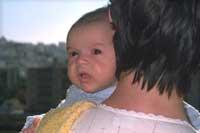Demanding vision of children
This research began with the search for a solution for adults with difficulties to differentiate the faces of human beings or to detect facial expressions. As soon as studies begin, children discover that with six months, they better separate the faces of monkeys than humans. As children mature, they lose that skill of perception, and above all they learn to differentiate human faces.

"The brain is the one that provides resources to differentiate faces," according to American professor Charles Nelson. According to this professor, "experiences with different faces are fundamental to analyze the ability to recognize facial emotions, as well as to differentiate faces."
Man learns to distinguish the faces of animals from different species. People who work with chimpanzees, monkeys or other species, for example, distinguish them perfectly. But these human beings are not born with that skill: they are only born with the ability to work and learn that skill. The same case is what they learn to differentiate different types of birds or car models. The same applies to languages: children of six months distinguish sounds from any language, but with the passage of months they begin to distinguish only the melodies of their mother tongue.
These American scientists still do not know how the part of the brain related to human vision manages to separate faces. Therefore, in the next studies, the neurological equivalent of this decrease in perception will be analyzed.
Buletina
Bidali zure helbide elektronikoa eta jaso asteroko buletina zure sarrera-ontzian











